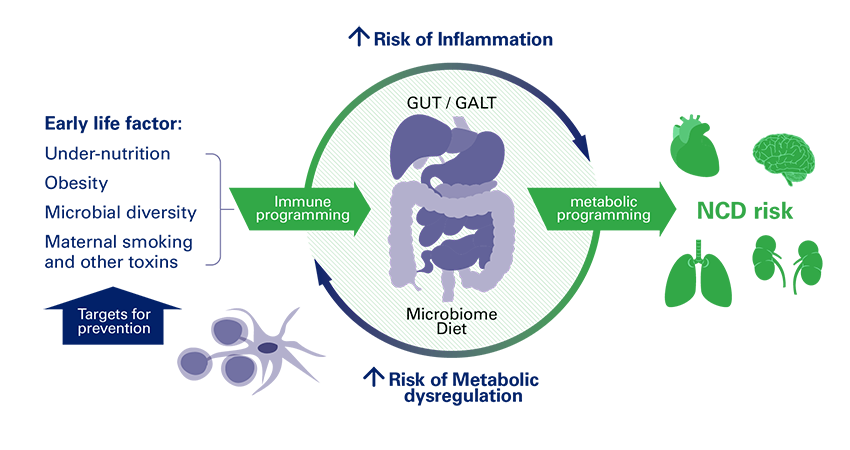
How can Early Nutrition Help to Manage Allergy, Obesity and Other Non-Communicable Diseases?
After nearly 100 years in the lexicon, is it time for an update to the saying ‘you are what you eat’? It’s becoming increasingly clear that we are in fact what we have eaten from a very young age, and even what our mothers have eaten.

Researchers are discovering that early nutrition has implications for how well we live and how long we live. Chronic diseases of virtually all of the body’s organ systems (‘non-communicable diseases’, or NCDs) are dramatically increasing in modern societies, and nutritional changes are thought to be at the heart of this pandemic. And it really is a global problem. We have two extremes in this world – overnutrition and undernutrition – and both are making us sicker.
Shared risks, shared solutions?
A perennial hot topic is the rise and rise of allergies, which represent specific vulnerabilities of the immune system. Like the proverbial canary in a coalmine, allergy can in some ways be seen as an early measure of the broader impact of our changing environment on the health of our immune systems. Indeed, it has been shown that allergy shares similar risk factors with many of the other NCDs that are on the rise [Prescott 2013].
Immune effects may appear in early development, particularly in babies born to mothers with unhealthy diets, or who have reduced diversity of gut microbes. To successfully prevent the onset of NCDs, then, we have to start in early life – before disease processes are established [Prescott 2013].
Preventing NCDs through nutrition and lifestyle
While we are not yet at a stage where we can think about tackling specific risks through nutrition, there are a number of things that can be done from a general perspective. Things like encouraging women who plan to get pregnant to have a healthy pre-pregnancy body mass index, and to help these women maintain a healthy weight gain pattern during pregnancy [Hutcheon et al. 2015]. And, of course, we already know the importance of having a well-balanced diet in pregnancy for giving infants the best possible start [Englund-Ögge et al. 2014; Marques et al. 2014]. We also need to avoid the harmful exposures we know about. The number of women smoking during pregnancy is still high in many regions of the world, despite the very clear evidence that maternal smoking harms lung development in babies [Harding & Maritz 2012].
Coming back to the topic of allergies, we are witnessing something of a U-turn in that we no longer think that allergens are causing the allergy epidemic. In fact, advice to avoid specific allergens (for example, peanut, milk and egg) may be doing more harm than good. A new study found that early introduction of peanut into the diet of babies at high risk for peanut allergy actually reduced the number who developed peanut allergy by 80% [Du Toit et al. 2015].
But if not allergens, then what? The short answer is we don’t yet know. Unpicking the complex environmental and lifestyle changes that cause allergy and other NCDs presents us with an enormous challenge, but by focusing on shared risk factors we can hopefully establish common targets for prevention.

Nutrition plays a key role in metabolic and immune programming, which increases NCD risk
See our other experts opinion




